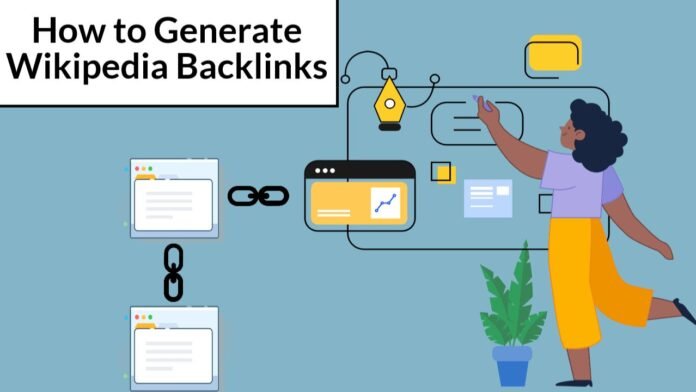Backlinks are important components of search engine optimization (SEO) and represent the authority currency. Only some websites hold as much weight regarding authoritative backlinks as Wikipedia. This article will cover the methods and approaches required to obtain backlinks from one of the most reliable websites.
Why Wikipedia Backlinks Matter
Wikipedia backlinks hold immense significance in SEO for several compelling reasons:
- Wikipedia is one of the most trusted and authoritative websites on the internet, making backlinks from it highly valuable in the eyes of search engines.
- These backlinks provide a stamp of credibility for your website, signaling to users and search engines the dependability and credibility of your material.
- Since Wikipedia pages often rank well in search results, obtaining a backlink can significantly enhance your website’s visibility and organic traffic.
In essence, securing backlinks from Wikipedia is not just about improving SEO rankings; it’s about establishing your website as a reputable source of information in its respective field.
The Importance of Backlinks
Before discussing the specifics of acquiring backlinks from Wikipedia, it’s crucial to grasp why backlinks are essential for SEO. Referred to as “backlinks,” or endorsements from other websites, they inform search engines like Google that your website is trustworthy and merits a higher rank. SEO experts strongly value backlinks from authoritative websites because they have even more weight.
The Power of Wikipedia Backlinks
Wikipedia is one of the most visited websites globally and ranks exceptionally well in search engine results. This combination of popularity and authority makes backlinks from Wikipedia incredibly valuable. However, securing a backlink from Wikipedia is challenging. The platform has stringent guidelines and a vigilant community of editors dedicated to maintaining accuracy and reliability.
Steps to Get a Backlink from Wikipedia
To successfully acquire a backlink from Wikipedia, one must follow a systematic approach:
- Conduct thorough research: Identify relevant Wikipedia pages related to your website’s niche or topic.
- Identify relevant Wikipedia pages: Target articles closely related to your content or industry.
- Create high-quality, reliable content: Develop informative, well-researched content that adds value to Wikipedia articles.
- Citing credible sources: Back up your claims with reputable sources and ensure all information is verifiable.
- Writing objectively and neutrally: Maintain a neutral tone and avoid promotional language or bias.
- Contributing to existing articles: Explore opportunities to enhance existing Wikipedia articles with valuable insights or additional information.
- Following Wikipedia’s editing guidelines: Familiarize yourself with Wikipedia’s editing guidelines and adhere to them strictly.
- Building trust with the Wikipedia community: Engage with other Wikipedia editors, participate in discussions, and contribute positively to the community.
Best Practices for Obtaining Wikipedia Backlinks
Securing backlinks from Wikipedia requires more than just adding a link to a page. It entails:
- Build ng a strong Wikipedia profile.
- Establishing credibility and expertise in your field
- Engaging with the Wikipedia community in a meaningful way
- Offering valuable contributions and insights
- Exercising patience and persistence in your backlink-building efforts
Tools and Resources for Wikipedia Backlink Building
Fortunately, there are several tools and resources available to assist in the process of acquiring Wikipedia backlinks:
- Wikipedia’s editing tools and tutorials
- Online guides and resources on Wikipedia editing
- Collaborating with experienced Wikipedia editors who can provide guidance and assistance
Common Mistakes to Avoid
In the pursuit of obtaining Wikipedia backlinks, it’s essential to steer clear of common pitfalls, such as:
- Adding promotional content or spams links
- Editing Wikipedia articles without providing proper citations or sources
- Disregarding Wikipedia’s guidelines and policies
- Engaging in edit wars or contentious disputes with other editors
Benefits of Wikipedia Backlinks
Securing backlinks from Wikipedia can yield a multitude of benefits for your website, including:
- Improved search engine rankings due to enhanced credibility and authority
- Increased website traffic from users clicking on your Wikipedia link.
- Enhanced online visibility and credibility, as Wikipedia is viewed as a trustworthy source of information
Navigating Wikipedia’s Guidelines
To increase your chances of obtaining a backlink from Wikipedia, it’s essential to familiarize yourself with the platform’s guidelines for external links. Wikipedia strictly prohibits self-promotion and requires that all external links meet specific criteria:
- Relevance: The linked page must provide additional, valuable information related to the Wikipedia article’s topic.
- Reliability: External sources must be reputable and verifiable, preferably from authoritative sources.
- Non-commercial: Links should not serve promotional or commercial purposes.
- Neutrality: Content linked must maintain a neutral point of view and avoid bias or subjective opinions.
Four Steps to Getting Backlinks on Wikipedia
In the dynamic domains of digital marketing and search engine optimization (SEO), backlinks are critical to success. In terms of authority backlinks, Wikipedia is less significant. Obtaining a Wikipedia backlink can significantly raise your website’s exposure and authority in search engine results pages. It can take time and effort to navigate the complicated terrain of community standards and Wikipedia’s principles. Do not be alarmed! We’ll simplify the procedure into four easy stages in this post to assist you in getting backlinks from Wikipedia.
Step 1:Recognize the Rules on Wikipedia.
Before diving headfirst into the backlinking process, it’s essential to familiarize yourself with Wikipedia’s guidelines for external links. Wikipedia maintains strict stan ards to ensure the accuracy and reliability of its content. Some key points to keep in mind include:
- Links must be relevant to the topic and provide additional valuable information.
- External sources should be reputable, reliable, and verifiable.
- Avoid self-promotion or links that serve commercial purposes.
- Content linked must maintain a neutral point of view and avoid bias.
Comprehending and following these recommendations will improve your chances of getting Wikipedia backlinks.
Step 2: Identify Relevant Wikipedia Articles
Once you’ve grasped Wikipedia’s guidelines, the next step is to identify relevant articles where you can potentially include your backlink. Seek out subjects that are directly relevant to your industry or niche. TaConsiderublications that address ideas, conclusions from studies, or data that correspond with the material you wish to link to. Member, relevance is key to ensuring your backlink adds value to the reader’s experience.
Step 3: Create High-Quality Content
With your target Wikipedia articles identified, it’s time to create compelling content worthy of inclusion. Whether a blog post, research study, whitepaper, or infographic, your content should be informative, well-researched, and free from promotional language. Aim to provide valuable insights or additional context that enhances the Wikipedia article’s overall quality. By offering genuinely valuable content, you increase the likelihood of editors considering your backlink for inclusion.
Step 4: Engage with the Wikipedia Community
Navigating the Wikipedia community can be intimidating, but building positive relationships with editors is crucial to building backlinks. Engage with the community by making constructive edits, participating in discussions, and adhering to Wikipedia’s guidelines. Avoid any actions that may be perceived as spam or self-promotion. Instead, focus on contributing valuable content and providing assistance where needed. Establishing trust and credibility within the Wikipedia community will increase your chances of successfully securing backlinks.
Crafting Compelling Content
Once you’ve identified a relevant Wikipedia article in which you’d like to include your backlink, it’s time to create compelling content worthy of inclusion. Whether it’s a blog post, research paper, or informational guide, your content should be well-researched, informative, and add value to the topic discussed on Wikipedia.
Building Relationships with Wikipedia Editors
Navigating Wikipedia’s community of editors can be intimidating, but establishing positive relationships can significantly increase your chances of securing a backlink. Engage with editors by contributing valuable edits, participating in discussions, and adhering to Wikipedia’s guidelines. Gaining the community’s trust might help editors decide whether to include your content.
The Art of Citation
One of the most effective strategies for obtaining backlinks from Wikipedia is through citations. If your content contains valuable information that can enhance the accuracy and credibility of a Wikipedia article, editors may consider including it as a citation. However, ensure that your content adheres to Wikipedia’s reliability standards to increase the likelihood of citations.
How to get Backlink from Wikipedia for Free
Getting a Wikipedia backlink can greatly increase your website’s authority and exposure in search engine results. Even if it might appear difficult, there are ways to get a backlink for nothing.
- Identify a Wikipedia article relevant to your niche or industry.
- Create valuable content, such as a well-researched blog post or informative infographic, that complements the topic of the Wikipedia article. Engage with the Wikipedia community by making constructive edits and adhering to Wikipedia’s guidelines.
- Respectfully suggest your content as a valuable addition to the article, providing a compelling reason for editors to include your backlink.
You can secure a backlink from Wikipedia with persistence and dedication at no cost.
Wikipedia Backlink services
Wikipedia backlink services offer a tempting shortcut to boost your website’s SEO. However, relying on such services can come with risks. While they promise quick results, they often violate Wikipedia’s strict guidelines, which may lead to your website being penalized or banned. Instead of resorting to dubious practices, focus on creating high-quality, valuable content that naturally earns backlinks. Engage with the Wikipedia community by contributing useful edits and adhering to their guidelines. Building genuine relationships with editors increases your chances of securing legitimate backlinks. Remember, there are no shortcuts to long-term SEO success. Invest your efforts in ethical strategies prioritizing quality and relevance for sustainable results.
How to get Backlinks for Free
It takes strategy and ingenuity to obtain backlinks for free. Finding reputable websites in your field or business where you can provide insightful content should be your first step. Send tai or pitches proposing your knowledge or insights to website owners or editors in return for a hyperlink. Use social networking sites to promote your material and get natural backlinks. To build a reputation and automatically draw backlinks, participate in industry-related online communities and forums by interacting with people and sharing your knowledge. Finally, to find fresh opportunities for ink-building, keep a close eye on your website’s performance and backlink profile. If you are persistent and take the initiative, you may get quality backlinks without exceeding budget.
Buy Wikipedia links
Purchasing Wikipedia links may seem like a quick fix for boosting your website’s SEO, but it’s a risky endeavor with potentially severe consequences. Link buying and selling are forbidden on Wikipedia, and violators risk severe consequences, such as having their links removed or being banned from editing Wikipedia entirely. Moreover, bought links frequently require greater legitimacy and relevancy, which reduces their ability to raise the rating of your website. Build organic backlinks by producing high-quality content, interacting with your audience realistically, and using ethical SEO techniques rather than taking shortcuts. The SEO and reputation of your website will improve if you invest in long-term, sustainable solutions.
Conclusion
In conclusion, acquiring backlinks from Wikipedia requires a strategic approach, adherence to guidelines, and patience. Website owners and digital marketers may leverage Wikipedia backlinks to boost their SEO efforts and increase their online success by following the methods indicated, participating in the Wikipedia community, and making meaningful contributions.
FAQ
Are Backlinks from Wikipedia Worth It?
Absolutely. Wikipedia is a very authoritative and trustworthy platform; hence, backlinks from it are quite important in SEO. They can increase the legitimacy of your website, make it more visible in search engine results, and bring in relevant visitors.
Is it Beneficial for SEO to Link to Wikipedia?
Yes, linking to pertinent Wikipedia pages can help with search engine optimization. It raises the authority and reliability of your website by showing search engines that your content is credible and well-researched.
How can I Locate Wikipedia Page Links?
You can find links to Wikipedia pages by researching keywords associated with your industry or specialization. After you’ve identified those themes, search for related Wikipedia articles. Seek opportunities to link to your website from those pieces as a useful resource.
How can Backlinks be Extracted?
Backlinks from Wikipedia can be extracted by identifying relevant Wikipedia articles where your website or content could provide value. Reach out to Wikipedia editors with a polite request to include your link, providing a compelling reason why it would benefit their readers. Alternatively, contribute valuable content to Wikipedia articles and include your link where appropriate, ensuring it adheres to Wikipedia’s guidelines.




